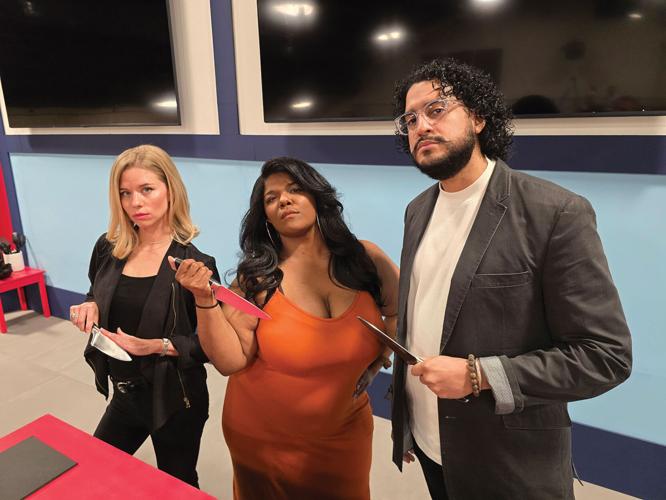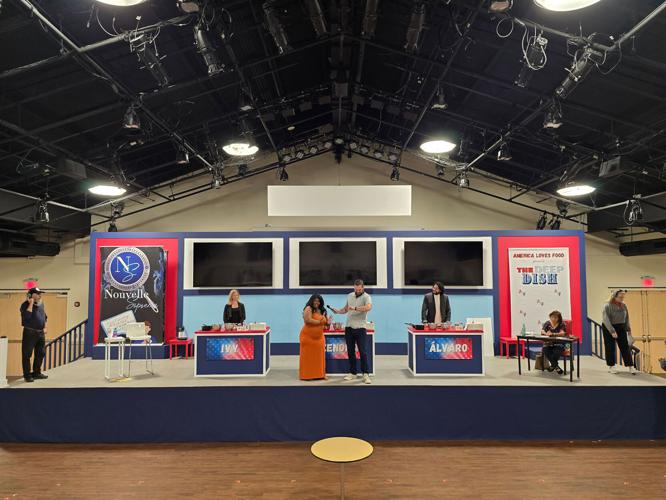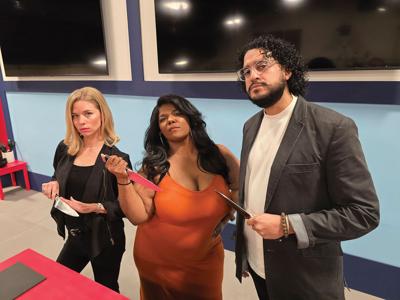A televised cooking show might seem a rather unusual setting for an opera. But as Nashville Opera prepares to unveil the world premiere of The Cook-Off this weekend — which will show as part of a double bill with Bon Appétit! The Julia Child Opera — artistic director John Hoomes says this offbeat one-act comedy offers more than just a recipe for fun.
Featuring music from acclaimed Nigerian American composer Shawn E. Okpebholo and a libretto by Pulitzer Prize-winning writer Mark Campbell, The Cook-Off follows a competitive cooking show in which three contestants battle to make the best macaroni-and-cheese. But beyond the playful premise, this fast-paced opera touches on the origins of the beloved comfort food — often wrongly attributed to Thomas Jefferson — and the “erasure of Black Americans’ contributions to America’s culture.”
“At its heart, The Cook-Off is absolutely a comedy,” says Hoomes, “but the set-up is really clever.” Hoomes is a frequent champion of new works, and he notes that The Cook-Off is Nashville Opera’s ninth world premiere. “I mean, we’ve all tuned into the Food Network, so the structure is very familiar and accessible. But there’s also a subtle message, as we get into the history behind macaroni-and-cheese and where it really comes from. For so long, Thomas Jefferson was credited with bringing the dish to America, when in fact it was his enslaved cook James Hemings who had traveled to France with Jefferson, and studied cooking while there. So The Cook-Off talks about that. It talks about the importance of acknowledging our history and giving credit where credit is due. It’s not heavy-handed, but it’s there. And I think that adds an important layer to the storytelling.”
The Cook-Off was developed through the Chicago Opera Theater’s Vanguard Initiative, an innovative training program for emerging opera composers. Established in 2018, the program offers participants a wide range of real-world experience and support, matching each composer with a more established librettist to create a full-length opera.

“My residency with Chicago Opera Theater was incredibly valuable in helping me grow as a composer,” says Okpebholo, a Chicago-based artist who received a Grammy nomination for his 2022 album Lord, How Come Me Here? — a thoughtful collection of reimagined Negro spirituals. “Because no matter how good a composer you may be, an opera is just a whole new ball game. You have to be able to think beyond the composition itself, thinking about the story and characters and stage directions — all the ins and outs of opera.”
Interestingly enough, Okpebholo says The Cook-Off not only represents his first foray into opera, but also his first comedy.
“I must admit that comedy is really hard,” says Okpebholo, who’s perhaps best known for his Two Black Churches, a haunting song cycle that contemplates both the 1963 16th Street Baptist Church bombing in Birmingham, Ala., and the 2015 Mother Emanuel AME Church shooting in Charleston, S.C. “It’s honestly much easier to make people cry. Comedy is tricky, especially in terms of timing and pacing, and making room for those laughs — you really have to think about the music in a different way. But it’s also really rewarding to create a piece of art that I think so many people will be able to relate to. And working with Mark [Campbell] has been an absolute dream. He’s just brilliant.”
One might also assume that comedy would be a bit of a departure for Campbell, who has written 41 opera librettos, along with lyrics for seven musicals, and text for many song cycles and oratorios. After all, he received a Pulitzer Prize for Silent Night, which was adapted from the film Joyeux Noël, and offers a tender account of the 1914 Christmas truces during World War I. And some of his other notable works include The Shining, Stonewall, The (R)evolution of Steve Jobs (which received a 2018 Grammy Award for Best Opera Recording) and As One — a chamber opera that follows a transgender woman’s journey.
“Comedy has always sort of been my default,” he says. “Even in works like Silent Night or The Shining, comedy is very important. It offers a great way for the characters to connect with the audience. Plus, I guess I just have a very irreverent view of opera — so to take something as unextraordinary as a televised cooking show and make it operatic is just immediately funny to me.
“I really hope that people enjoy it,” he adds. “Because The Cook-Off is, first and foremost, an entertainment. But I also hope that they walk away really thinking about our nation’s history and things like slavery and racial legacy. John [Hoomes] has put together a wonderful cast, and has been so terrific to work with. I appreciate his commitment to new and unusual works. I feel like so many people have a very narrow view of what opera can be — all kings and queens and mythology. That’s why I’m so happy to be working with Nashville Opera — they’re breaking down those perceptions, and moving the art forward.”







